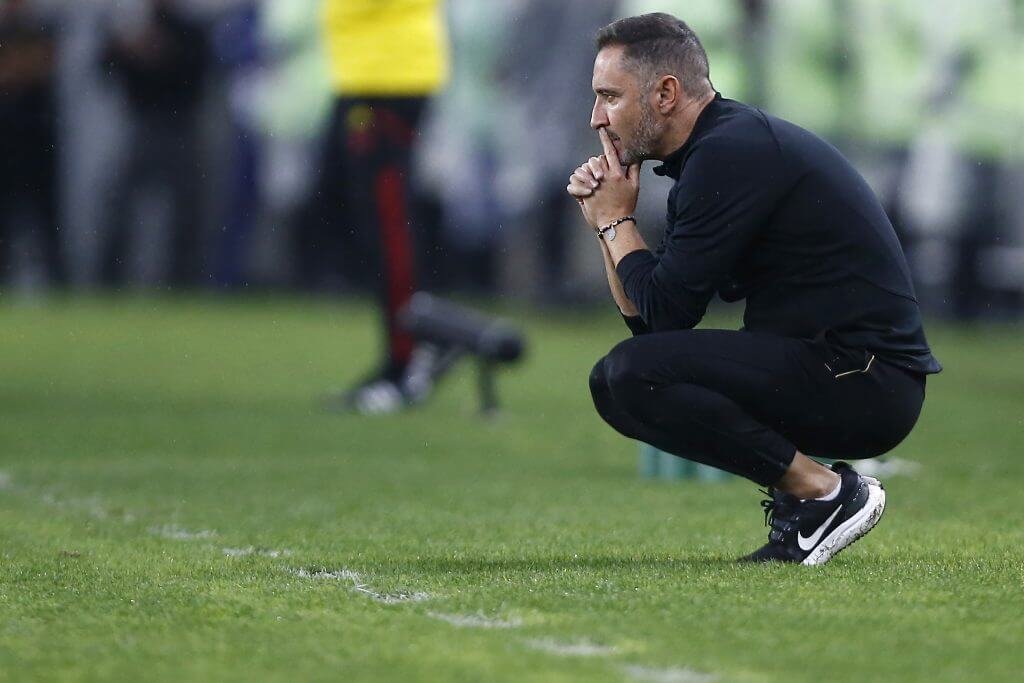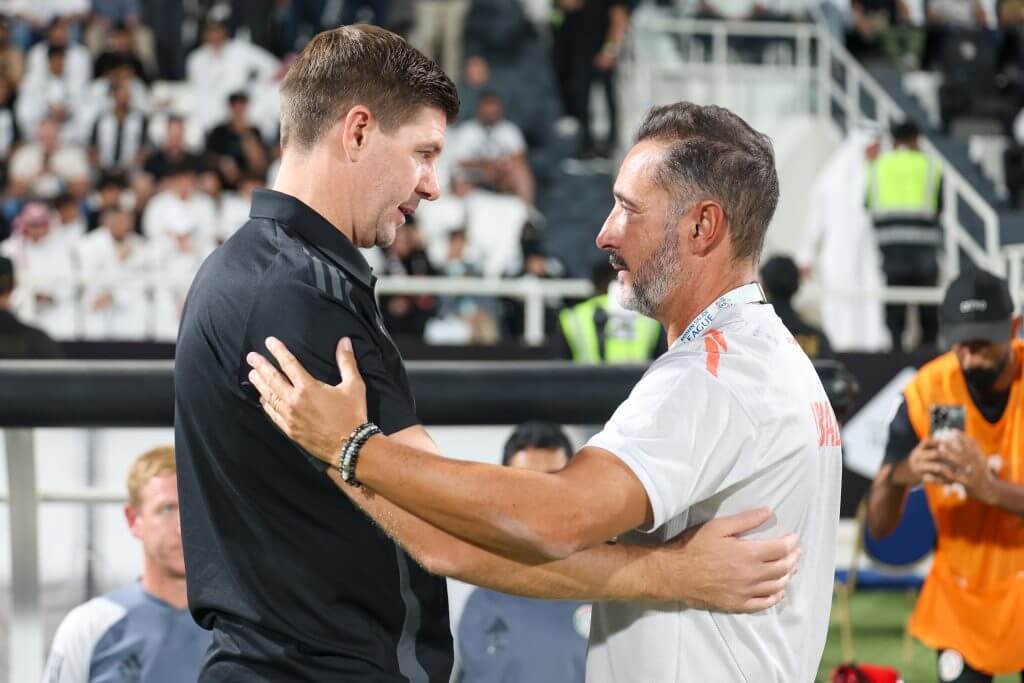A decade ago, Vitor Pereira was a manager on the rise, seemingly on course to become the next star to emerge from the Portuguese coaching conveyor belt.
In his mid-40s, he had followed successful countrymen Jose Mourinho and Andre Villas-Boas in climbing through the ranks at Porto, won two Primeira Liga titles and was offering advice to Pep Guardiola.
In the summer of 2014, midway through his two-year first spell in Saudi Arabia, Pereira travelled to Germany for a week-long fact-finding mission with Guardiola’s Bayern Munich. The German giants had lost 5-0 on aggregate to Real Madrid in the previous season’s Champions League semi-finals and Guardiola was looking for ways to stop his side leaking goals.
During lunch at Munich’s Hotel Kempinski, Pereira says the table became a football field as the new Wolverhampton Wanderers boss gave the most celebrated manager of his generation an honest opinion.
“I told him exactly what I think: ‘Pep, in certain games you keep exposing your defensive line in the transition,’” Pereira told the Portuguese newspaper Record in a 2014 interview.
“He agreed and replied: ‘Do you have a reason? I’ve already realised that. I’m still looking for an exercise that allows me to solve the problem.’
“I told him: ‘I’ll give you a suggestion. If you accept, here it is.’ And I gave him one exercise, explaining that I had already experienced the same problem in my team and that I had resolved it that way.”
The next day, Pereira said, he returned to Bayern’s training ground to find Guardiola locked in his office studying and adapting Pereira’s suggested training drill. By the afternoon it was in use on the training field.
Back then, the possibilities for Pereira’s career still felt endless. Like Mourinho and Villas-Boas before him, he had learned the ropes on the lower rungs of the Porto coaching ladder having had no top-level playing career — Pereira was a centre-back in Portugal’s lower leagues. He had studied at university under the tutelage of Vitor Frade, the coach and academic who pioneered the “tactical periodisation” method of coaching that combined physical, technical, tactical and psychological elements of football into the same coaching sessions and who inspired Mourinho.
And, just as Mourinho appointed Villas-Boas as his assistant coach at Porto, so Villas-Boas chose Pereira as his No 2 when he became manager.
When Villas-Boas left for Chelsea in 2011 having won the league, domestic cup and Europa League treble, Pereira was promoted to the top job, having previously been a manager in Portugal’s lower divisions at Sanjoanense, Espinho and Santa Clara.
He built on Villas-Boas’ success with two more successive domestic titles, losing just once in two years, and achieving the highest league win percentage (78 per cent) of any Porto manager to have managed 30 games or more.
Vitor Pereira, right, with Andre Villas-Boas at the Europa League final in Dublin in 2011 (Jamie McDonald/Getty Images)
By 2013, he seemed destined to follow Mourinho and Villas-Boas to Europe’s bigger leagues. But his Sliding Doors moment came when he made a two-man shortlist to succeed David Moyes at Everton.
Pereira had already chosen to leave Porto to pursue his ambitions of managing in one of Europe’s ‘big five’ leagues. When the Everton job went instead to Roberto Martinez, Pereira accepted an offer from Saudi Arabian side Al Ahli which, he admitted, was designed to safeguard his family’s financial future.
The move marked the start of a frantic 11 years that now, with his arrival at Wolves, has taken him to 10 different clubs across 11 managerial jobs spanning seven countries and three continents. Throughout it all he has retained the ambition of managing in the Premier League but, he says, his own lack of patience to wait for a job in one of Europe’s top leagues has contributed to his itinerant recent career.
“I’m probably a bit to blame,” he told the Spanish newspaper Marca last year. “I don’t have the patience to wait for the right opportunity to come along.
“For me, football is like breathing and when I start to run out of air, I have to return to the pitch. If a project in a big league comes along, fine, but if not, I’m not going to wait around.”
If Pereira’s impatience has contributed to his unusual career path then so, too, has his mixed record. Since Porto, he has enjoyed some stunning successes, with further league titles in Greece with Olympiacos and China with Shanghai Port, plus several domestic cups. But he also endured failure, such as relegation with 1860 Munich, two separate sackings by Fenerbahce and controversy in Brazil, where he left Corinthians in November 2022 citing personal issues but returned just three months later to manage Flamengo.
Throughout, though, he retained a reputation as a talented, energetic coach. He came close to landing the manager’s jobs at Sevilla and Everton again in 2022, before losing out to Frank Lampard for the latter.
Mads Davidsen, who was sporting director of Shanghai and appointed Pereira to once more succeed Villas-Boas in 2017, told The Athletic: “The coaching was, as we’d hoped and expected, not that far away from Andre’s.
“The whole Portuguese coaching education was very strong in those years and their methodology was recognised across the world.

Pereira admits he can lack patience, which has contributed to his itinerant career (Wagner Meier/Getty Images)
“So that was more or less ‘plug and play’. Compared to Andre, he probably had more defensive quality as a coach. That’s where he was really strong, whereas Andre was a bit more of a risk-taker in terms of ‘Let’s attack and see what happens’, so the game could be more open.
“So it was a good mix for us to have someone who developed the offensive side of our game and then someone who developed the defensive side, and that’s probably why we ended up winning that year because the team was more complete.
“Most Portuguese coaches are very hard-working in that they come in early in the morning and stay all day doing analysis and videos and planning. They bring a lot of energy on the pitch with really vocal and energetic sessions, and Vitor was like that. He gave it everything he had.”
Throughout his unusual coaching journey, Pereira has earned a reputation as an unpredictable, temperamental, sometimes outspoken but always passionate force. Journalists, players and sometimes even media officers have felt the force of his temper, perhaps helping to explain why some jobs have gone spectacularly well while others have unravelled quickly.
“Vitor is an explosive guy who says what he has to say to the players and to the press,” Record’s executive editor David Novo told The Athletic FC Podcast this week.
“People remember press conferences that went viral in Saudi Arabia and in Portugal. And then in Brazil, he had that spell when he left Corinthians saying he had personal issues and then went back to Brazil to manage Flamengo, and they felt a betrayal.
“He is an explosive guy, intense and obsessed with football, as he admitted several times in several interviews. Is that good? It can be bad if the results are not what the fans expect, and the board and the players.”
But among many who know him well, Pereira commands a fierce level of loyalty.
“Vitor is a person with strong ideas and a strong personality,” a former coaching colleague at Porto, Pedro Emanuel, told The Athletic. “Maybe on the first viewing of him, he looks like he’s not friendly, but he’s a fantastic guy.
“But he is also a strong personality who knows very well what he wants and he fights for what he believes. Of course, this is important for any new manager but especially for someone who is coming to a new league — a dream that he dreamed of and worked to achieve. And, at this moment, I believe he is prepared and ready to start a new chapter in his coaching career.”
At Wolves, first impressions could be vital. Pereira will inherit a team with just two league wins from 16 games this season and with discipline in the spotlight after post-match meltdowns involving Mario Lemina, Rayan Ait-Nouri and Matheus Cunha after former boss Gary O’Neil’s final two defeats.
Pereira’s reputation for taking a hard line on player behaviour could be crucial, as could his ability to curb his own penchant for emotional outbursts.
“This was probably my only yellow flag when I was involved in the recruitment process,” admitted Davidsen. “You only have to look at YouTube for some old press conferences and other clips. So of course I knew he was an emotional guy who could be a bit eccentric. But we just talked about it and I was able to say that it was something he could not do in China.
“Vitor understood that and I can certainly say that in my time there his behaviour was very professional and he maintained a calmness in tough times. So we knew of his reputation, but we never saw it.”
Before his most recent coaching assignment with Al Shabab, back in Saudi Arabia, Pereira took time out after his eventful period in Brazil to visit and study some of Europe’s most vaunted young coaches, including former Brighton boss Roberto De Zerbi.
He used his time in the Saudi Pro League as a testing ground for new ideas, switching from his previously preferred 4-3-3 system to a new-look 3-4-3 that will be familiar to Wolves fans.
He seemed likely to leave Al Shabab when his contract expired this summer and return to Europe in search of his long-desired big-league challenge, but now that moment has arrived sooner than expected.

Pereira with Steven Gerrard during Al Shabab versus Al Ettifaq (Yasser Bakhsh/Getty Images)
With their Premier League future hanging in the balance, Wolves are gambling on a coach whose career shows him capable of both spectacular highs and dramatic setbacks.
“Vitor at the moment is a well-prepared coach for a team like Wolverhampton,” says Emanuel. “He has a lot of experience in different leagues, strong leagues, and when Andre left Porto he took over the team for two seasons and he became champion.
“That is part of what Vitor is. He is a very focused coach with very clear ideas about the way he wants to play and I believe that is always good. Of course, all coaches have weaknesses and they come with defeats, but that is professional football and all of us have those.
“He improved all the time, he improved the teams he worked with and that is something he will do when he arrives at Wolverhampton.”
(Top photo: Alex Grimm – FIFA/FIFA via Getty Images)
Read the full article here


